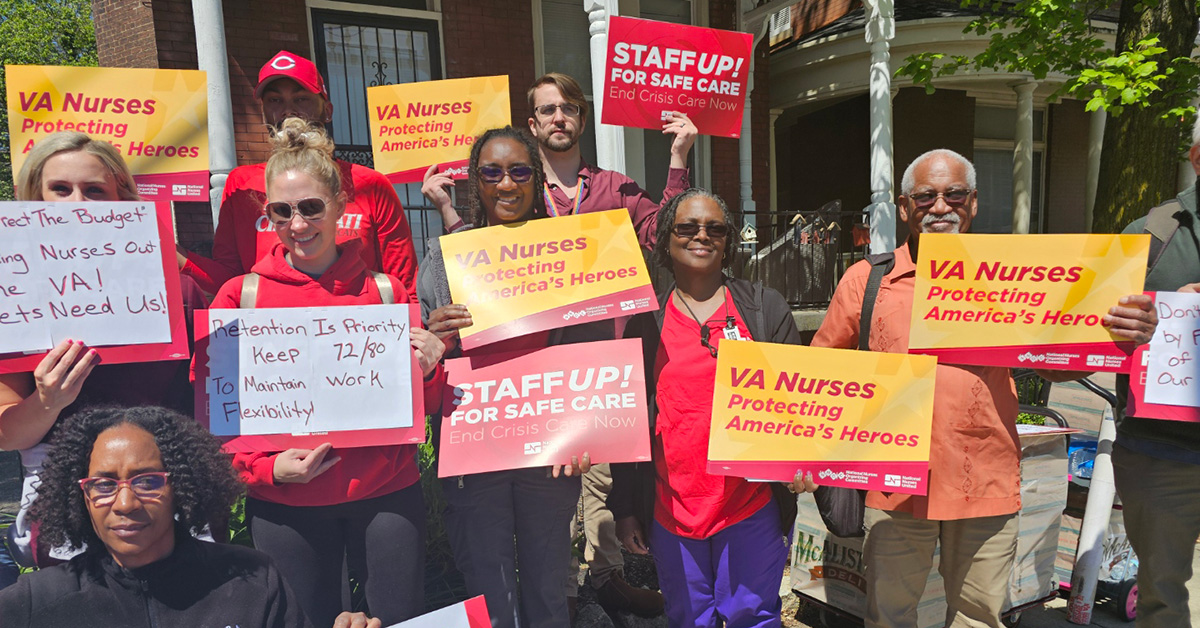VA nurses speak out for safe staffing

Staff report
National Nurse magazine - April | May | June 2024 Issue
This spring Veterans Administration nurses from Georgia to Ohio have been rallying, protesting, and picketing for patient safety and safe staffing. They are represented by National Nurses Organizing Committee (NNOC), an affiliate of National Nurses United.
RNs at the Joseph Maxwell Cleland Atlanta VA Medical Center, in Decatur, Ga., held a protest in March to call attention to their serious patient safety concerns, including ongoing short-staffing, poor security measures to prevent workplace violence, and a lack of leadership accountability. NNOC represents 900 registered nurses at the Atlanta VA Medical Center.
“Nurses have made repeated requests for over a year for the installation of metal detectors at entrances to keep dangerous weapons out of our workplace,” said Florence Uzuegbunam, NP and Atlanta-area NNU associate director. “It is unacceptable and incomprehensible that our requests and recommendations have not been addressed with the urgency and seriousness they deserve.”
VA nurses strongly support a comprehensive workplace violence prevention standard. The Workplace Violence Prevention for Health Care and Social Service Workers Act (S. 1176/H.R. 2663) is aimed at protecting nurses, other health care workers, and their patients from workplace violence.
Also in March, nurses at the Durham VA Medical Center in Durham, N.C., held a rally and speak-out to demand that the VA address their concerns about patient safety, moral distress among staff, and lack of flexible work schedules to retain nurses at their facility. NNOC represents roughly 950 registered nurses at the Durham VA.
In July 2023, the Durham VA piloted an alternative work schedule in two inpatient units, known as “72/80.” According to the VA’s own research on the pilot program, the policy is expected to save the Durham VA $1.73 million annually when fully implemented in all inpatient units. However, because the program has not been expanded beyond the two units, some nurses have been leaving the Durham VA. Because the VA hiring process can take months, retaining nurses is especially critical for maintaining patient safety.
“We need to retain our nurses so we can give our veterans the best care,” said Libby Manly, RN. “Nurses are outraged that Durham VA leadership has not fully implemented this program when we know it works well for nurses, veterans, and the VA. We demand that all inpatient nurses get to participate in this program.”
In April, RNs at the Cincinnati VA Medical Center held an informational picket to highlight their deep concerns about patient care if the administration moves forward with plans to reassign RNs to work in areas where they do not have training nor expertise.
Cincinnati VA administration notified 27 float pool nurses on April 2 that they would be reassigned to work in the VA nursing home, gastrointestinal lab, catheterization lab, or hemodialysis, with the majority assigned to work in the nursing home, which has expanded from 48 to 62 beds. These RNs currently work in a variety of inpatient units and have training and certifications in acute care. They do not have training in the areas of nursing where management wants to reassign them. NNOC represents roughly 670 registered nurses at the Cincinnati VA.
“The safety of our patients may be in jeopardy due to this plan to move nurses without fully reviewing staffing methodology and RN competencies to ensure safe, therapeutic care for our veterans,” said Shana Rivera, RN at the Cincinnati VA. “Nurses have specialized training. Our veterans need RNs with specialized skills and competencies to care for each veteran population. Our veterans deserve to have safe care.”
VA nurses also call on Veterans Affairs Secretary Denis McDonough to encourage Congress to pass the VA Employee Fairness Act, which would grant RNs full bargaining rights so they can improve care at the VA. Nurses say passing the VA Employee Fairness Act will enable NNU to bargain over staffing issues, which will result in better outcomes for veterans and nurses.